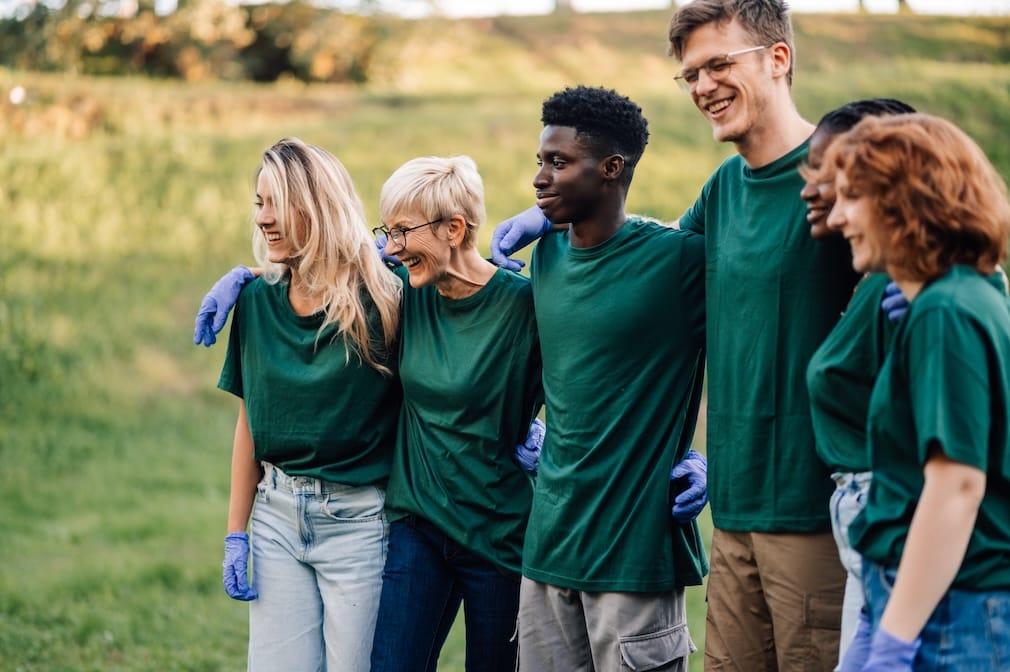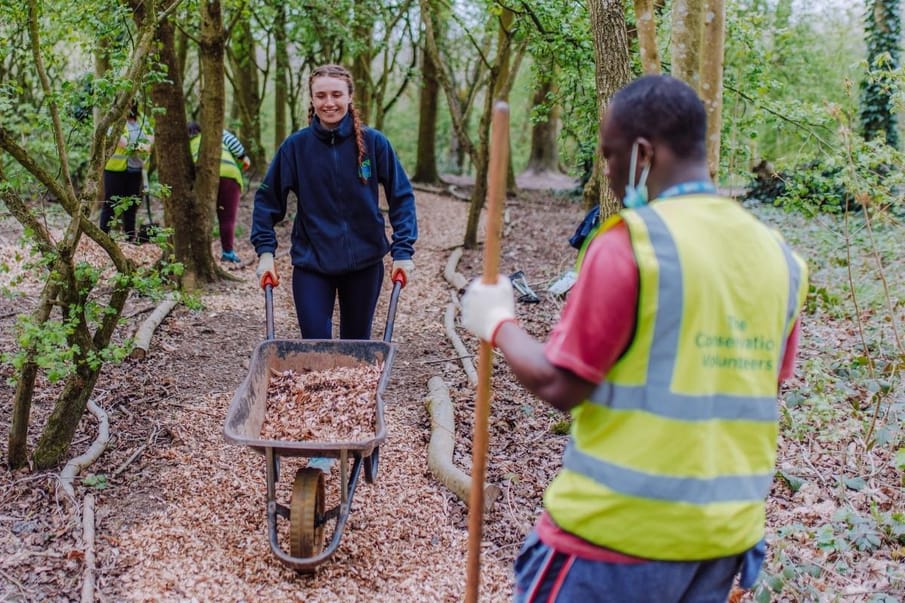We’re putting community initiatives in the spotlight, and today, we’re meeting The Conservation Volunteers, who are giving environmental action the green light…
In a verdant public park, a group of volunteers work together to cut back brambles that are spilling on to the path, making it easier for the local community to enjoy this space. They take a tea break, sipping their refreshing drinks and nibbling on biscuits, talking and laughing before picking up their garden tools and getting back to work.
The Conservation Volunteers (TCV) work with communities across England, Northern Ireland, and Scotland, bringing people together to create, improve, and care for green spaces. This includes everything from community gardens, parks, and nature reserves to hospital grounds, waterways, wetlands, and woodlands. Founded in the 1950s, it has now grown to 376 groups and projects.
One of these is the Biodiversity Action Team North London. Its Brent group started in autumn 2024, after receiving funding from Brent Council to bring more biodiversity into the area, focusing on 12 green spaces.
Volunteer Judith has been part of the group from the start. “I just wanted to be outside and do something practical and useful, to make a difference,” she says.
During the pandemic, Judith spent a lot of time walking, and discovered lots of green spaces in her local area. She wanted to continue spending time outdoors, especially after finishing work the summer before, alongside doing something physically active. She has experienced anxiety and depression, and finds time in nature supports her wellbeing.
During the sessions, she says, “We’re among nature and bird life, and the flowers and the trees. It’s just great. We learn how to use a number of tools, try different jobs like deadheading, lopping trees, and cutting back brambles.”
A typical session lasts from around 10am–3pm, with a midmorning tea break and time for lunch, which gives volunteers the chance to get to know each other while refuelling.
“We’ve found that people come to TCV for one thing, but then end up finding all of these other outcomes,” says Anna Gailey, who works for TCV nationally, while contemplating why people volunteer. “They might come initially because they want to help support their local green space or their local environment, but they end up finding all the social benefits, and they might suddenly get a burst of confidence because they’ve been in that social situation, and they can learn new skills. Plus, being outside in nature really helps your mental and physical health.”
And that’s the wonderful thing about volunteering, the benefits are vast – both to the individual giving back, and for the cause they’re supporting – from building self-esteem to reducing loneliness, and a report from Forest Research states that the health benefits of volunteering are increased when it takes place in the natural environment. With eco-anxiety on the rise (the Office for National Statistics found that three-quarters of UK adults are worried about the impact of climate change), this acts as a driving force that has encouraged more people to get involved in this kind of work.
“When we’re working, we get stopped by people, and they talk to us,” says Judith, reflecting on how the sessions help get local people interacting with each other, including those who aren’t directly involved in the group, in turn strengthening those community bonds.

“I’ve met lots of different people, which is lovely,” Judith adds. “We all learn from each other. Everyone brings different skills and experiences. Or some have very little experience, but are keen to learn. And I love all that. It’s a very diverse group.”
Making a difference to the environment is an integral part of TCV’s work. At a time where many of us feel overwhelmed by the climate crisis and seemingly endless environmental issues, being able to positively support the planet feels particularly powerful.
According to Greenpeace, wildlife numbers have seen a staggering decline of 69% on average in the past 50 years, with around 2 million species now threatened with extinction. Biodiversity loss is one of the most pressing environmental issues of our time, which is why much of TCV’s current work focuses on this issue.
“It’s about creating those rich natural environments for people to access, and where wildlife, and different flora and fauna thrive as well,” explains Anna. This can involve creating bug hotels to increase insect numbers – something that supports other animals – and ensuring that native species of plants can thrive.
Hattie Jones, who works as senior project officer for TCV and is part of the Biodiversity Action Team North London, explains how they’ve facilitated a range of activities, from planting fruit trees in a community orchard to sowing a wildflower meadow. Their work is influenced by the seasons too, with winter offering the best time to work on trees, as this is when birds are no longer nesting.
A warm welcome awaits those who are interested in joining their local group. “I wasn’t quite sure what to expect, but as soon as I arrived, they made me feel very welcome,” says Judith. “They went through the safety procedures, and how to use tools. For every task, we’re always given the information that we need to do it, and we always have a choice – no one has to do anything they don’t feel comfortable doing.”
TCV has an interactive map on its website where you can search for opportunities near you and find out more about what’s involved. Whether it’s planting flowers or digging a pond, TCV’s volunteers are helping nature to thrive – all while meeting new people, and reaping the benefits of time spent outdoors.


Comments